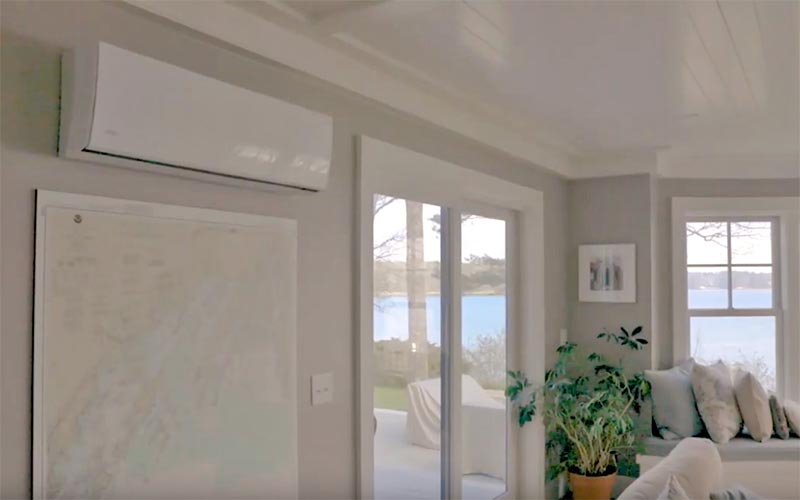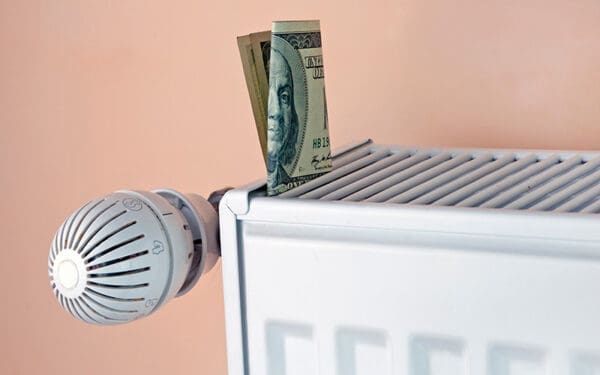
Switching to heat pumps is an important step in reducing emissions from the heating sector. Photo Credit: CLF
To solve the climate crisis, we need to power our lives without producing climate-damaging emissions. How we heat our homes, businesses, and industry is a major piece of that puzzle, especially in states like Rhode Island, where we experience long, cold winters.
Rhode Island estimates that 35% of its climate-damaging emissions come from heating, mostly through the burning of gas and other dirty fossil fuels. As large as this figure is, it still fails to properly account for the polluting gas that leaks out of our state’s aging infrastructure before it can even be burned.
Recently, state agencies released a report on transforming Rhode Island’s heating sector, offering options to reach our climate goals while ensuring we stay warm during the winter. One of the first studies of its kind, the report is a valuable resource for policymakers and can help the state transition to a clean energy future.
Now that Rhode Island has a clearer understanding of the steps it can and must take to clean up and decarbonize the heating sector, it must take action.
How Rhode Island Can Slash Emissions in the Heating Sector
Rhode Island must act quickly and decisively to ditch fossil fuels and eliminate carbon pollution from our economy. The new heating sector transformation report includes several high-impact policies to achieve this, many of which the state can begin implementing right now. For instance:
- We need to immediately adopt the 2020 Act on Climate Bill (S2165, H7399), which would make our emission reduction targets enforceable and bring them in line with the latest science. This will ensure that we have a plan to cut emissions to net zero by 2050 without causing upheaval in our economy.
- We must make energy efficiency an essential component of Rhode Island’s decarbonization strategy — because the cleanest, cheapest energy is the energy we don’t use at all. The state must do all that it can to strengthen and expand the scope of our energy efficiency programs. This will not only cut carbon pollution but save us all money on our monthly heating bills.
- Rhode Island needs to create a long-term, equitable program to incentivize the switch to heat pumps. Using heat pumps, compared with fossil fuels like oil, propane, and gas, can substantially reduce our emissions and often save homeowners money.
- We must adopt a 100% Renewable Energy Standard. The cleaner our electricity is, the more we benefit from ditching fossil fuels – including by reducing air pollution that makes us sick. In January of 2020, Governor Gina Raimondo signed an Executive Order committing Rhode Island to 100% renewable electricity by 2030. We need to turn her words into real action.
Rhode Island Must Leave Fossil Fuels, Including Dirty Gas, Behind
More than half of Rhode Island households use dirty gas for heating, and most of the rest use even dirtier fuels like oil. To lower our state’s emissions, this needs to change. But we can’t just swap one dirty fuel for another. We need to phase out all fossil fuels and replace them with clean alternatives.
Among the technologies discussed in the heating sector report are so called “decarbonized fuels,” misleadingly called “renewable natural gas” by the fossil fuel industry. They’re made by converting things like manure and industrial food waste into methane — the primary ingredient in dirty fracked gas — and used to supplement or replace traditional fossil gas.
But despite promotion and misleading branding from fossil fuel companies, this fuel is highly problematic.
First, its primary component is still methane – an extremely potent greenhouse gas. To the extent that we use this fuel, we will still be relying on the same crumbling infrastructure that delivers our fracked gas now. According to recent report, accurately accounting for methane leaks from our current infrastructure increases Rhode Island’s overall estimated emissions by a whopping 45%! In other words, continued usage of these dirty fuels and this aging infrastructure is simply incompatible with our emissions reduction goals.
Second, “renewable natural gas” is actually too scarce to be useful and too expensive to make sense for our economy.
And, finally, methane is bad for public health, regardless of where it comes from. Direct exposure to methane can cause headaches, dizziness, vomiting, and in extreme cases, death. And the nitrogen oxides and other chemicals produced when methane is burned can cause or worsen serious health issues.
It’s clear that these fuels are the gas industry’s attempt to lock us into their polluting products and aging infrastructure. It doesn’t make any sense to commit ourselves to our dangerous, leaky gas infrastructure for decades to come.
Continued usage of these dirty fuels is incompatible with our climate goals. It’s time to focus on truly clean technologies like heat pumps if we’re going to cut our climate-damaging emissions and avoid the worst impacts of climate change.
Rhode Island Can, and Must, Change How it Heats Homes and Businesses
We know from experience that relying on dirty gas to heat our homes and businesses can lead to thousands left stranded in the cold. We also know that there are reliable, cleaner alternatives out there – like heat pumps powered by solar and wind.
To get our state on track to cleaning up the heating sector, Rhode Island legislators need to take this latest report into account and immediately begin implementing some of its recommendations. Our policymakers know their options – now they must act on those that will truly make a difference for our climate.



